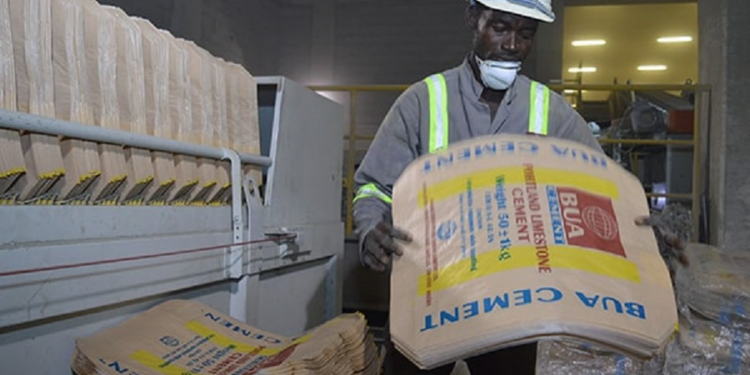Chairman, board of directors of BUA Cement, Abdul Samad Rabiu has disclosed that efforts by the company to crash the price of cement in Nigeria was thwarted by middlemen who bought cement from it at the rate of N3,500 but went ahead to sell at about N8000 per bag.
He said the decision of the company at its annual general meeting last year to sell the product at a low rate was further compounded by devaluation of the Naira, exchange rate volatility and the hike in cost of business operation as a result of the removal of fuel subsidy by the federal government.
“So, we could not sustain that simply because we were not going to be in a situation where we are subsidising dealers. This is like subsidising the dealers. So, we got to the point where the FX rate, the exchange rate, you know, deteriorated from when we decided to sell it at N3,500, which then the rate was about N450 to maybe N1,800 or N1,900 to $1.
“So, it became even more challenging and more difficult for us to actually sustain that price. But we had already sold huge quantities at the time, almost 2 million tons at the time. There was nothing we could do,” the business mogul said yesterday at the 8th annual general meeting of BUA Cement in Abuja.
Beside the highlighted challenges, Rabiu said other manufacturers of cement products were not also ready to cut prices to make the product affordable to Nigerians. BUA Cement by Dangote Cement and LAFARGE Cement in Nigeria. “For whatever reason, other manufacturers were not ready to bring down the price. We were left alone and we could not satisfy the market at that level.
“On top of the fact that dealers were also taking advantage, we saw a situation where we were actually supplying cement and selling cement at N3,500 Naira per bag, but customers were buying at 7,000, 8,000 Naira. It pained us because we wanted that price to stay at that low level.
But dealers refused and continued to focus on that,” he stated. BUA currently has 17 million tons total installed production capacity at its various plants in Edo and Sokoto states.
Rabiu said energy cost has become the major drain to the revenues of the company with the firm spending between N15 and N16 billion on energy supply monthly which is over 60 percent of its operating cost. He said the huge money is spent on diesel, LNG and spare parts. “Many things are beyond our control,” he said, adding that the situation was partly responsible for the increase in the retail price of cement.
Rabiu said the company has commenced the building of a mini LNG plant for power generation to power its machines as part of efforts to cut cost of production.
A review of the company’s financial report showed that the company recorded a 27.4 per cent growth in net revenue to N460 billion from N361 billion reported in 2022. Also, its capacity utilisation improved to 61.2 per cent in 2023 from 59.8 percent in 2022, due to an increase in cement volumes dispatched, and which also resulted in an increase in market share.
Shareholders of the company unanimously approved the sharing of N2 per share for the year ended 31 December 2023.
The company’s profit after tax declined by 31.2 per cent to N70 billion from N101 billion recorded in the corresponding period ended 2022. Rabiu said the profit was impacted by foreign exchange losses, which arose from the devaluation and the continued depreciation of the Naira.
A shareholder, Bisi Bakare appreciated the board and management of the company for being able to minimise revenue that culminated in the sharing of N2 dividend per share.
Chairman of Trusted Shareholder Association, Muktar Muktar congratulated the chairman for leading the expansion of the company’s cement factories that has seen an increase in cement production.
Meanwhile, Rabiu has also announced a target of 11 million metric tonnes installed capacity for the company in the coming year of 2025. He also announced that the management has ordered 400 new trucks which will be delivered soon to increase supply of cement products across the country.
“And as you are all aware, we have just commissioned a new line in Congo this year. And we are actually going to dedicate that line just to the southwestern part of the country. So that’s the reason why we need maybe about 1,000 trucks, but we have 400 trucks now.
“And by the time we get the remaining trucks, we will dedicate almost everything to that region. And that is going to give us about 150,000 tons a month that will be delivered to the southern part of the country. And the beauty of it is that the cement, poor cement, as I mentioned, is of the highest quality,” he said.



